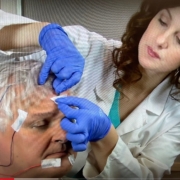Understanding the Risks: High Blood Pressure and Strokes in Untreated Obstructive Sleep Apnea
High Blood Pressure and Strokes in Untreated Obstructive Sleep Apnea
Obstructive Sleep Apnea (OSA) is a common but serious sleep disorder affecting millions worldwide. Characterized by repeated interruptions in breathing during sleep, OSA can lead to a host of health complications if left untreated. Among the most significant risks associated with untreated OSA are high blood pressure (hypertension) and strokes. At Comprehensive Sleep Care Center, we are dedicated to raising awareness about these risks and providing effective treatment solutions to improve the quality of life for those affected by OSA.
The Link Between OSA and High Blood Pressure
OSA is a condition where the airway becomes blocked during sleep, leading to pauses in breathing and a drop in blood oxygen levels. This triggers a stress response in the body, releasing stress hormones like adrenaline. These hormones increase heart rate and blood pressure. Over time, the constant spikes in blood pressure during sleep can lead to sustained hypertension.
Mechanisms Behind the Risk
- Sympathetic Nervous System Activation: The repeated episodes of apnea activate the sympathetic nervous system, causing blood vessels to constrict and heart rate to increase.
- Endothelial Dysfunction: The inner lining of blood vessels (endothelium) can be damaged by the fluctuating oxygen levels, impairing their ability to relax and leading to increased vascular resistance.
- Increased Inflammation: Chronic intermittent hypoxia (low oxygen levels) can lead to systemic inflammation, contributing to the development and progression of hypertension.
The Connection Between OSA and Stroke
A stroke occurs when the blood supply to part of the brain is interrupted or reduced, depriving brain tissue of oxygen and nutrients. OSA significantly increases the risk of both ischemic strokes (caused by blockages) and hemorrhagic strokes (caused by bleeding). This risk is due to several factors linked to untreated OSA:
- Increased Blood Pressure: As previously mentioned, hypertension is a major risk factor for stroke. The constant high blood pressure from untreated OSA puts extra strain on blood vessels in the brain.
- Atherosclerosis: OSA can accelerate the build-up of plaque in arteries, leading to atherosclerosis, which narrows and hardens the arteries, increasing the risk of blockages.
- Blood Clot Formation: The repetitive stopping and starting of breathing can lead to blood clot formation, which can travel to the brain and cause a stroke.
The Importance of Early Diagnosis and Treatment
Early diagnosis and treatment of OSA are crucial in mitigating these risks. Comprehensive Sleep Care Center offers a range of diagnostic and treatment options tailored to each patient’s needs. The most common treatment for OSA is Continuous Positive Airway Pressure (CPAP) therapy, which keeps the airway open during sleep. Other treatment options include lifestyle changes, oral appliance therapy, and in some cases, surgery.
Benefits of Treatment
- Reduced Blood Pressure: Effective OSA treatment can lead to a significant reduction in blood pressure, decreasing the risk of hypertension-related complications.
- Lower Stroke Risk: By addressing the underlying causes of OSA, the risk of stroke can be significantly reduced.
- Improved Overall Health: Treatment of OSA can improve sleep quality, daytime alertness, and overall cardiovascular health.
Untreated obstructive sleep apnea poses serious risks to cardiovascular health, particularly through the development of high blood pressure and increased risk of stroke. At Comprehensive Sleep Care Center, we are committed to providing the highest level of care to diagnose and treat OSA, helping our patients lead healthier, safer lives. If you or a loved one suspects they may have sleep apnea, we encourage you to seek a consultation with our specialists to explore your treatment options.
Contact us today to learn more about how we can help you manage and treat obstructive sleep apnea for a healthier future.











